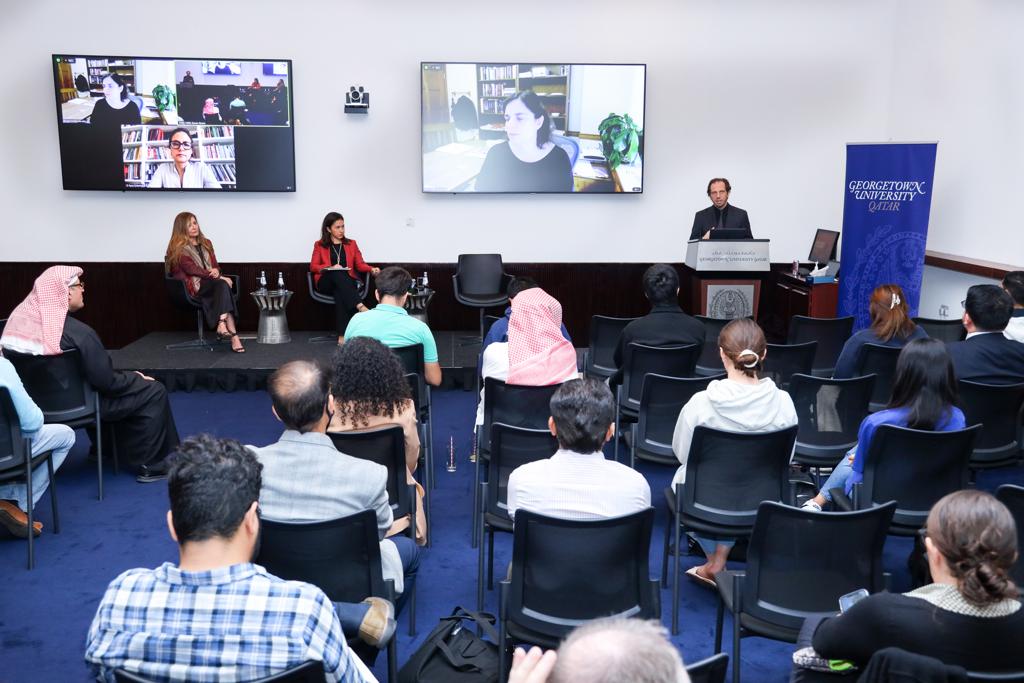
Fadel Abdul Ghany, Executive Director of SNHR, delivering his address on humanitarian intervention from the perspective of international law Photo taken from: Georgetown University in Qatar
Languages
Available In
The Georgetown University in Qatar and the American Society of International Law (ASIL) last month hosted a panel discussion on humanitarian-driven military intervention in conflicts and crises. The event, which featured Aslı Ü. Bâli, Professor of Law at Yale Law School, Ayça Çubukçu, Associate Professor in Human Rights at the London School of Economics and Political Science, Sarah Leah Whitson, Executive Director of Democracy for the Arab World Now, and Fadel Abdul Ghany, Executive Director of the Syrian Network for Human Rights (SNHR), was moderated by Noha Aboueldahab, Assistant Professor at the Georgetown University in Qatar. The event, held at Georgetown University in February, was attended by many researchers and graduate students.
In his address, Mr. Abdul Ghany tackled the question, ‘Shouldn’t humanitarian groups demand an intervention outside the scope of the UN Security Council in order to protect civilians in the event that murder crimes have reached the level of crimes against humanity?’ Using Syria as a case study, Mr. Abdul Ghany noted that Syria has exposed the failings of the UN Security Council, stressing that its failure to intervene to protect civilians in the Syrian case has led to vastly compounded losses. He added that the number of extrajudicial killings committed by the Syrian regime reached approximately 12,000 civilians by the end of 2011, around 80,000 by the end of 2012, and an estimated 140,000 by the end of 2013, with the number today far surpassing 200,000.
Mr. Abdul Ghany explained that the responsibility to protect involves three sequential levels: prevention, response, and reconstruction. He also emphasized four principles related to military intervention intended to protect civilians, adding that, given the UN Security Council’s failure to address the situation, it is possible to resort to the UN General Assembly on the basis of the ‘Uniting for Peace’ resolution. Even though this resolution is non-binding, he explained, it instills a sense of legitimacy into a military intervention.
Furthermore, he asserted that human rights organizations in similar circumstances, such as Rwanda, Syria, and Yemen, will have abdicated their role if they fail to demand a military intervention, effectively sending a message of helplessness to the victims. The SNHR founder stressed that he was talking purely in a theoretical and legal sense, since making such demands does not necessarily mean that states will respond, since it is a given that states are self-interested bodies. He added that in the wake of the failure of the Security Council and the UN mechanisms, it is the responsibility of human rights originations to demand the protection of civilians by any and all means including military intervention, which he stressed is a fundamental aspect of those organizations’’ human rights role and does not conflict with the objectivity needed in documenting the violations by all the parties to the conflict.
Finally, he stressed that there exist a set of criteria which those involved in any military intervention ought to respect in implementation, such as abiding by international humanitarian law, compensating victims in case the intervention results in victimizing people, and upholding a set of post-military intervention standards, which include following up on the transition of power, preserving peace, reforming the military and security sectors, protecting minorities, disarmament, and holding war criminals accountable. He also highlighted that human rights organization have a role to play in monitoring the implementation of the military intervention and the extent to which it is adhering to those standards, as well as monitoring the post-military intervention stages, documenting violations, and condemning the alliance carrying out the military intervention in case it is responsible for violations.
To watch the event in full, please click the link.


